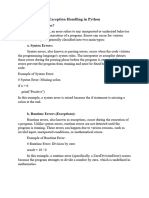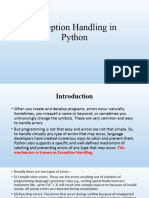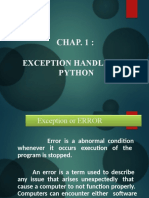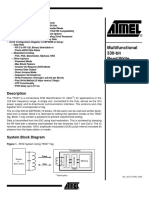0 ratings0% found this document useful (0 votes)
30 views10-python-error-handling
The document discusses error handling in Python programming, highlighting the types of errors (syntax errors and exceptions) and the importance of managing them to prevent program failures. It introduces keywords such as try, except, and finally for handling errors, along with examples demonstrating their usage. Additionally, it covers specifying exceptions and creating custom exceptions for better debugging and control over error management.
Uploaded by
Clarisse Allyson EnriquezCopyright
© © All Rights Reserved
We take content rights seriously. If you suspect this is your content, claim it here.
Available Formats
Download as PPTX, PDF, TXT or read online on Scribd
0 ratings0% found this document useful (0 votes)
30 views10-python-error-handling
The document discusses error handling in Python programming, highlighting the types of errors (syntax errors and exceptions) and the importance of managing them to prevent program failures. It introduces keywords such as try, except, and finally for handling errors, along with examples demonstrating their usage. Additionally, it covers specifying exceptions and creating custom exceptions for better debugging and control over error management.
Uploaded by
Clarisse Allyson EnriquezCopyright
© © All Rights Reserved
We take content rights seriously. If you suspect this is your content, claim it here.
Available Formats
Download as PPTX, PDF, TXT or read online on Scribd
You are on page 1/ 35
Error Handling
Engr. Hiroyoshi DG. Arai
Error. Error? Error!
• In programming, there are cases where errors can
occur not because your code is bad, but because
the inputs don’t match the data type of the
function.
• For example, converting a letter into integer will
cause a ValueError.
• Or simply, the mathematical operation is just not
possible, such as dividing by zero which will cause
ZeroDivisionError
Error. Error? Error!
• Getting these errors can lead to
unexpected behavior or even stop the
program from executing.
• This is why programs should always handle
these errors in such way when an error
occurs, the program will be able to handle
it and will still continue to function.
Error. Error? Error!
• In python programming, there are 2
kinds of errors:
– Syntax Error These are the errors from
missing a symbol, or not following the
format of a function.
– Exceptions these are the errors that the
python will raise when an exact error
occurred.
Error Handling Keywords
• Python provides a way to handle
these errors in an easy and simple
format by using these keywords:
– try
– except
– finally
try Keyword
• This keyword means to try to execute
the block of code until it produces an
error.
• If it doesn’t produce an error, it will just
continue and do nothing special.
• However, if it encounters an error, it
will raise an exception.
except Keyword
• This keyword executes the block of
code when an error occurred.
• This basically catches the program
from failing and gives an instruction
on what to do in case of an error.
finally Keyword
• This keyword executes regardless of
what happens to the code inside the
try-except block.
• This part can be omitted, but it can
be useful for some cases such as file
handling.
Error Example
>>> print(“Today, we will divide a number by zero”)
>>> print(30 / 0)
Today, we will divide a number by zero
Traceback (most recent call last):
File “<pyshell#0>”, line 2 in <module>
print(30/0)
ZeroDivisionError: division by zero
>>>
• ZeroDivisionError was raised because you cannot divide
by zero arithmetically.
try – except Example
>>> try:
>>> print(“Today, we will divide a number by zero”)
>>> print(30 / 0)
>>> except:
>>> print(“Hey! You cannot divide by zero!”)
Today, we will divide a number by zero
Hey! You cannot divide by zero!
>>>
• Here, error occurred at line 3, however, since it is under a try
block, it raised an exception. except block of code will execute.
try – except-finally Example
>>> try:
>>> print(“Today, we will divide a number by
zero”)
>>> print(30 / 0)
>>> except:
>>> print(“Hey! You cannot divide by zero!”)
>>> finally:
>>> print(“I’ll do this regardless”)
Today, we will divide a number by zero
Hey! You cannot divide by zero!
I’ll do this regardless
try – except-finally Example
>>> try:
>>> print(“Today, we will divide a number by one”)
>>> print(30 / 1)
>>> except:
>>> print(“Hey! You cannot divide by zero!”)
>>> finally:
>>> print(“I’ll do this regardless”)
Today, we will divide a number by zero
30
I’ll do this regardless
Specifying exceptions
• except keyword is a very strong tool in python
programming, however, most new programmers
often use it in such a general way to except ALL
errors.
• By doing this, you will have a silent error and can
cause trouble when debugging.
• The best practice is to always specify what
exception to except in order to have a better flow
for your program.
Specifying exception
>>> try:
>>> print(“Today, we will divide a number by one”)
>>> print(30 / 0)
>>> except ZeroDivisionError:
>>> print(“Hey! You cannot divide by zero!”)
>>> finally:
>>> print(“I’ll do this regardless”)
Today, we will divide a number by zero
30
I’ll do this regardless
Specifying multiple exception
>>> try:
>>> names = [“Alan”, “Bob”, “Cassie”, “Daisy”]
>>> print(names[5])
>>> except ZeroDivisionError:
>>> print(“Hey! You cannot divide by zero!”)
>>> except IndexError:
>>> print(“Index is out of bound.”)
Index is out of bound.
Exceptions
• Python has over 60 built-in exceptions
that it can raise when an error is
encountered.
• These exceptions are organized into
two groups:
– Base class exceptions
– Concrete exceptions
Base Class Exceptions
• You can think of these as the general exceptions for most
errors.
– BaseException base class for all built-in exceptions. This also
includes SystemExit, KeyboardInterrupt, GeneratorExit exceptions.
– Exception base class for all built-in non-system-exiting
exceptions.
– ArithmeticError base class for all built-in arithmetic errors.
– BufferError raised when a buffer related operation cannot be
performed.
– LookupError raised when a key or index used on a sequence is
invalid.
Concrete Exceptions
• These are the more specific exceptions that python will
raise under the base class exception. Examples are:
– ImportError raised when the import statement fails to load a
module.
– IndexError raised when the sequence subscript is out of
range.
– NameError raised when a local or global name is not found.
– TypeError raised when an operation or function is applied to
an object of inappropriate type.
– ValueError raised when an operation or function receives an
argument that has the right type but an inappropriate value.
Exception Table
Exception Table
Exception Table
Exception Table
Exception Table
Exception Heirarchy
Custom Exception
Here is the OOP part!
Engr. Hiroyoshi DG. Arai
Custom Exceptions
• These exceptions are classes.
• From one of the pillar of OOP inheritance, it is
possible to inherit a class.
• Therefore, we can define a class that inherits
these exception to create a custom exception.
• These custom exceptions are useful for
debugging programs when you already know
what exactly went wrong with it.
Custom Exceptions
raise keyword
• this keyword is
used to raise
an exception
and stops the
control flow of
the program.
Custom Exceptions Examples
Custom Exceptions Examples
Custom Exceptions Examples
Custom Exceptions Examples
Custom Exceptions Examples
You might also like
- Exception Handling_Python[1] [Read-Only]No ratings yetException Handling_Python[1] [Read-Only]18 pages
- Unit-II Exception Handling and MultithreadingNo ratings yetUnit-II Exception Handling and Multithreading123 pages
- Unit v 2.Exception Handling in Python(NEP)No ratings yetUnit v 2.Exception Handling in Python(NEP)28 pages
- Introduction To Exception Handling in Python Class 12 Computer Science100% (3)Introduction To Exception Handling in Python Class 12 Computer Science16 pages
- 13539_253_125_Python_Exception_Handling_M3No ratings yet13539_253_125_Python_Exception_Handling_M36 pages
- Exceptions and Error Trapping in Python (Autosaved)No ratings yetExceptions and Error Trapping in Python (Autosaved)41 pages
- II - I - CSE - Python Programming - Unit-2 - Exceptions - Mate - 240426 - 180429No ratings yetII - I - CSE - Python Programming - Unit-2 - Exceptions - Mate - 240426 - 18042922 pages
- Programming Puzzles: Python Edition: The Guide to Sharpen Your Coding Skills with Engaging and Challenging PuzzlesFrom EverandProgramming Puzzles: Python Edition: The Guide to Sharpen Your Coding Skills with Engaging and Challenging PuzzlesNo ratings yet
- Handout 41 Techniques of Circuit AnalysisNo ratings yetHandout 41 Techniques of Circuit Analysis32 pages
- DHCP MAC Address Filter Management Made Easy With DHCP PowerShell - Microsoft Windows DHCP Team Blog - Site Home - TechNet BlogsNo ratings yetDHCP MAC Address Filter Management Made Easy With DHCP PowerShell - Microsoft Windows DHCP Team Blog - Site Home - TechNet Blogs1 page
- Unit Ivdata Resource Management and DssNo ratings yetUnit Ivdata Resource Management and Dss95 pages
- Battery Protection Analog Front End (AFE) IC: DescriptionNo ratings yetBattery Protection Analog Front End (AFE) IC: Description24 pages
- St. Xavier'S College: (Affiliated To Tribhuwan University)No ratings yetSt. Xavier'S College: (Affiliated To Tribhuwan University)31 pages
- Sr. IT Infrastructure Security Specialist Resume ExampleNo ratings yetSr. IT Infrastructure Security Specialist Resume Example7 pages
- Ddos Attacks, Detection Parameters and Mitigation in Cloud EnvironmentNo ratings yetDdos Attacks, Detection Parameters and Mitigation in Cloud Environment4 pages
- Surgical Instruments Names and Uses PDF DownloadNo ratings yetSurgical Instruments Names and Uses PDF Download4 pages
- The Future of Statistics and The Data ScienceNo ratings yetThe Future of Statistics and The Data Science5 pages
- Cybersecurity Analyst Interview Questions and Answers100% (1)Cybersecurity Analyst Interview Questions and Answers15 pages
- Review On Artificial Intelligence in Power System Transient Stability AnalysisNo ratings yetReview On Artificial Intelligence in Power System Transient Stability Analysis14 pages
- WINSEM2022-23 STS3204 SS CH2022235002579 Reference Material I 01-03-2023 L39 NetworkingNo ratings yetWINSEM2022-23 STS3204 SS CH2022235002579 Reference Material I 01-03-2023 L39 Networking20 pages
- 1 Avalanche Transceiver Test 2013 - 2014No ratings yet1 Avalanche Transceiver Test 2013 - 201419 pages


































































































